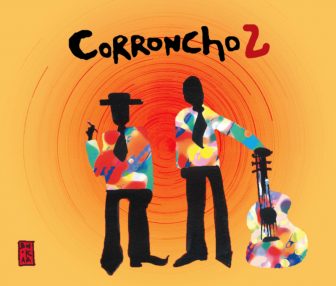
Phil Manzanera (solo, Roxy Music) – Hit Channel
HIT CHANNEL EXCLUSIVE INTERVIEW: March 2017. We had the great honour to talk with a legendary musician and producer: Phil Manzanera. He is best known as the lead guitarist of Roxy Music. He has also been a member of 801 and Quiet Sun and has collaborated with David Gilmour, Pink Floyd, John Wetton, Nico, Robert Wyatt, Godley & Creme and many others. He just released “Corroncho 2” with Lucho Brieva and the live album “Live at the Curious Arts Festival”. Read below the very interesting things he told us:
Can you describe to us the road trip concept of the “Corroncho 2” album?
Well, the album is a story really of these two characters, who are two “Corronchos” natives of Cartagena, on the Caribbean coast of Colombia. The story starts on the beach in Cartagena on New Year’s Eve. One of them has taken ayahuasca and the other one has drunk too much aguardiente, which is the local firewater and they have a collective dream. They dream a white horse with wings that invites them to the north. They think: “Ah, this is a sign saying we must go to the Promised Land”, which is in theory, for a lot of South Americans, the USA. So, they jump in a Lowrider car, which is actually the first track from the first album (2011). It’s a special kind of car and instead of turning left, they make a mistake and they turn right. So, they have to travel around the whole South America to get to Queens, New York where most of Latinos live. The story is really about the adventures of the road trip around South America and in each country there is a song about that country or the reflection on that country. Eventually, they go under the border between Mexico and America illegally. They get to New York and basically they find that all the Latinos are arguing among themselves and the prejudices that they have about the different countries in South America exist. Eventually, they get held up by a Mexican rapper in order to rob them (laughs). Then, they come home and they realise that they should stay in their country and make their country better than looking for the Promised Land in the USA. So, it’s quite an appropriate story, really. We were doing it for about 5 or 6 years. The album is coming out right now with the Trump administration and it’s very appropriate for the time.
Why you decided to cover “Live Forever” by Oasis on “Corroncho 2” album”?
On the first album we did some covers as well by putting them translated into Spanish and putting them in a different context. They have a different significance. On the first album we did a Bob Dylan song, “Forever Young”. When we did it in Spanish a lot of people thought that it sounded like a hymn for the South American countries. This one, the Oasis song, we translated it into Spanish and I added some worlds from a famous Chilean poet, Pablo Neruda and it’s now a song in memory of the people who were buried by the Pinochet government in the Atacama Desert. So, it has a completely different meaning and significance to the one that Noel Gallagher intended to the Oasis. I think it’s an interesting idea when you translate something into another language. It has quite a different life.
I guess it was easy to get Robert Wyatt (Soft Machine) involved in “Corroncho 2” album, wasn’t it?
(Laughs) Robert worked here. I used to take advantage of the fact that he was here, at my studio, doing a little bit of work. I asked him if he would play some trumpet and on that particular track -the last one- “Volví”, in this very mournful lament. They were very sad when they returned to Cartagena from New York, because it didn’t work out for them. Robert has a wonderful sad voice. Not now that it’s plain, but his actual voice. There is a lot of emotion to it. I know Robert since 1967 and he has done some of his albums here. He’s a good friend.
What did you find in South American music that there isn’t in rock?
There is more utopia in South America. In Cuba or in Colombia. I have my roots in South American music. The first music that I learned was South American: cumbia, salsa… That was before I even heard of Elvis Presley or Chuck Berry or rock ’n’ roll or electronic music. That was my first music inside me because I took it from my mother. It’s my roots and I also found that the lyrics in Spanish had so different flavour to them than in English.
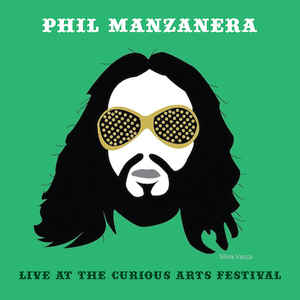 What’s special about your performance at the Curious Arts Festival that you recently released?
What’s special about your performance at the Curious Arts Festival that you recently released?
The Curious Arts Festival is very different to my latin music. I was doing a lot of music in Italy, I was doing a lot of stuff in Puglia, a very different kind of music. I was producing David Gilmour albums, Pink Floyd albums and I was asked to do one concert on my own and I thought that I hadn’t done one for at least ten years. So, I thought: “Ok. If I’ll do it, I will record it”. Then, I was thinking of what material to do. I thought a lot of these people probably have never heard any of my solo albums and I thought the most enjoyable thing was to do a mixture of my own stuff and Roxy Music, something that is more well-known. Because it’s always good to try to make the audience happy.
Are you looking forward to doing your Japanese tour dates this summer?
I think Japan is gonna be a really good time, because we are doing 8 gigs. They are quite a lot. So, we have to play for 75 minutes and there is an opportunity to do a wide range of things: my solo music, Roxy, Corroncho and new numbers. Yeah, it’s gonna be a lot of fun.
Were you surprised when you learned that Kanye West and Jay Z sampled you riff from “K-Scope” (1978) for their song “No Church in the Wild” (2011)?
(Laughs) Yes, I was very surprised. I thought it was Ray Manzarek from The Doors, because normally people get my name confused and they have done for years, especially in America. They rang me and said: “Jay Z and Kanye West sampled your riff”. It was on the phone from New York, Roc-A-Fella Records. I said “No, I think you made a mistake”. They said: “No, I think it’s you”. I said: “No, I don’t think so”. So, I said: “Play it to me”. They said: “We cannot send it to you because it’s top secret, but we will play it to you over the phone”. Then, I heard it and I said: “Ah, that is me, slowed down! Yeah, ok. Great. Bye bye”. Then, I thought: Hang on, they have to ask permission from the record company and the publishers because it’s coming out the next week and they don’t really feel pressed up. Then, I rang my record company that had brought the album out about 40 years ago, which is crazy. They said: “Ok, we are negotiating with them”. I said: “Well, you should have told me”. So, I was unhappy because of all this. That’s how it happened, yeah.
Are you proud of the classic album status that “801 Live” (1976) has?
Yes, I am very proud of “801 Live”. The whole concept was that we would only do this for six weeks. That’s the 801 idea. We planned it and we rehearsed for about four weeks. We played three concerts and we recorded one of them. It’s something that people still like now, 40 years later. People still talk about it, all over the world. It’s just one of those magic things that happened one night, one time at one gig that we recorded and we are talking about it now. I’m very lucky to work with these guys.
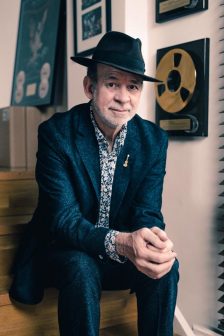 Were the Soft Machine a role model for Quiet Sun?
Were the Soft Machine a role model for Quiet Sun?
Yes, Soft Machine were our heroes. When we were at school and we were 15 or 16, they were the closest we knew to pop stars. They lived near to Bill MacCormick (ed: bass- also in Matching Mole). Every day, when we were at school we were talking about them, and we just followed their career the whole of time, because Bill’s parents knew Robert. We felt we were close to be professional musicians somehow. So, it was a big influence to all of us, and still is.
In your opinion, what made the music of Roxy Music so unique?
Roxy Music is so unique because there are 6 people who are very different but have certain musical faith in common that unifies us. But we had some other differences to face. We all had to create the musical context to Bryan Ferry’s unique voice to live in Roxy world. All bands try to create their own identity and it’s not very easy when you get different people. Because we weren’t a band that wrote something in a conventional way. The difference between us and David Bowie is that David Bowie could write proper songs. We just created interesting soundscapes to fit in Bryan Ferry’s world, but we didn’t know how to write proper pop songs. But our music is the best we could and that’s why it sounds different.
Brian Eno has said that the secret of Roxy Music was that they never talked about politics. Do you agree with this point of view?
(Laughs) I think if we started talking politics, we would have never started. We just kept it to the music and just playing, really. Then, gradually as you develop after many years, you may disagree with other people’s point of view. So, real life comes into it.
Was it an interesting experience for you to record “For Your Pleasure” (1973) at AIR Studios?
That was a magic time, actually. The time that we met the great producer Chris Thomas. He helped us incredibly with the sound and brought all the knowledge of working with The Beatles and George Martin (The Beatles producer) to us. We learned from him about recording with this classical, traditional English method of recording. At the same time we had an experimental side, which is part of our ingredients. Brian Eno and myself, we were experimenting and Chris used some wonderful professional recording techniques to us, and we learned that us well.
Is playing with different people is a form of evolution too?
It’s certainly a part of one’s personal evolution. You always learn when you are playing with other people, whether it’s worth to play or not to play. Musicians should have this musical conversation with a lot of different musicians from all over the world. Each country has its own culture and every kind of music is therapeutic in general and great things can happen by working together.
Do you think the collapse of the major recording labels is a kind of justice for their corporate greed all these years?
I would say “yes”, but they haven’t already collapsed, because now they are just making a lot of money with streaming and we, the artists, are still wondering where our money is, as always. With streaming they are making more and more money now. Every day, the multinationals are making millions and billions with streaming. Really, there needs to be a legislation to help musicians to get paid properly from streaming because the general public wants more music and I am very happy to do, but more musicians, especially young musicians need to have a guaranteed way of earning money, so they can pay their rent and food and stuff like that. So, there needs to be some proper legislation across the whole world for musicians.
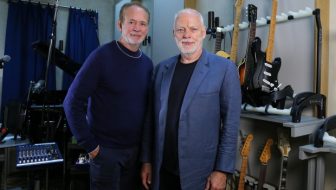 What is like to have three No.1 albums as David Gilmour’s co-producer?
What is like to have three No.1 albums as David Gilmour’s co-producer?
(Laughs) It’s very satisfying. It’s just one of the things that I do. You know, it’s very special for me, because I met him when I was 16 or 17 and I asked him –he was a friend of my brother- “What do you have to do to become a professional musician?” and he had just become a professional musician joining Pink Floyd. Then, many years later we worked together and it’s very satisfying. Life is quite strange when things like that happen.
When you were Musical Director at the Seville Guitar Legends Festival in 1991, did you have trouble guessing Bob Dylan’s setlist?
Yes, there was a challenge working with Bob Dylan. But, he’s Bob Dylan so I thought he sometimes plays games with people, but you know, he was always a hero of mine I was prepared for that. I had to rehearse him for a week in Seville before the concert and he kept changing his mind every day about what he was gonna play. None of us had any idea of what he was gonna play and if you look on the Youtube video of the concert, you can see us all wondering even though it was a television broadcast everywhere, we had no idea what songs he would play, so we were just looking each other trying to work out what the chords were. It was a tricky thing but he’s remarkable.
Do you have any musical ambitions left?
I am always looking to the next gig I do. I am concentrated to try doing the best I can. That’s my ambition. There is nobody I can think of that I am desperate to play with or not to play with. I just take it as it comes along and I’m trying to make it enjoyable. I really did the best I can on the Net, so the next thing is live in Japan. I just want to practice and get some new material together for these very concerts.
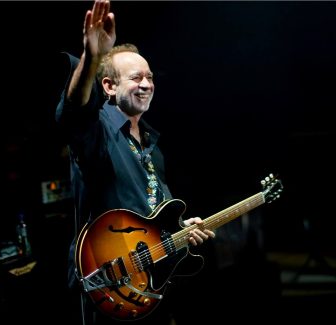 Simon Phillips (drums –Toto, Jeff Beck, The Who) joined your band (801) when he was 19 years old. Are there those kinds of opportunities today?
Simon Phillips (drums –Toto, Jeff Beck, The Who) joined your band (801) when he was 19 years old. Are there those kinds of opportunities today?
Oh, definitely. I have in my band some young musicians: João Mello who is from Curitiba in Brazil, he is only 21 and I got him the gig on the David Gilmour world tour. He is a fantastic saxophonist/keyboardist /singer/guitarist. I think over the years I have discovered some fantastic young musicians. Sonia Bernardo who sings on the “Curious Arts” album, is only 24. The other guitarist who plays with me, Lucas Polo de la Vega, is 24. He is from Spain and Sonia Bernardo is half Portuguese. There are opportunities if the older musicians help the young ones.
Do you think social media like Youtube and Facebook have helped younger listeners to learn about your music?
Definitely, yeah. I think there is a lot of curiosity among young listeners about what these names are, from musicians from the past. The ability to go and check them out on Youtube whether is The Beatles or the early Janis Joplin or Frank Zappa or the early Roxy from 1972. It’s a good way for people to discover for themselves. There is a good side to the whole Internet thing in terms of learning and teaching too. It has become very democratized, which is good.
Are you happy with the comeback of the vinyl records?
I concede that listening to vinyl is a very different experience to listening to one track on an iPhone or on the radio. So, it’s good that young people especially have been brought into vinyl as a different experience. It’s another good experience that luckily is coming back and is available for people. Yeah, I think it’s a very positive thing. It’s still just one of the many different ways of listening to music.
Did you like Bill Murray’s singing in “More than This” (Roxy Music -1982) in the film “Lost in Translation” (2003)?
(Laughs) Very much, yes. I like different versions of the Roxy tracks. You know, he made that track very popular and that was good too.
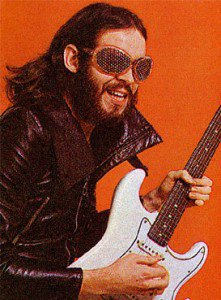 Can you tell us a few words about your friend John Wetton (King Crimson, Asia, UK) who recently passed away?
Can you tell us a few words about your friend John Wetton (King Crimson, Asia, UK) who recently passed away?
John Wetton was a brilliant singer and a brilliant bass player. He could combine the two, especially live, he was a force of nature. He could sing and play amazingly even if the whole sound on stage was actually terrible. He was a fantastic musician and a good friend. We did a lovely album together, the “Wetton Manzanera” album (1986) and he will be sorely missed. I went to his funeral a couple of weeks ago and a lot of friends turned up and there was nice music played. I’ve always have very fond memories of John Wetton.
A huge “THANK YOU” to Mr Phil Manzanera for his time and to Claire Singers for her valuable help. I should also thank Leonardo Pavkovic.
Official Phil Manzanera website: http://manzanera.com/new
Official Phil Manzanera Facebook page: https://www.facebook.com/philmanzanera
Official Corroncho Facebook page: https://www.facebook.com/CorronchoMusic
